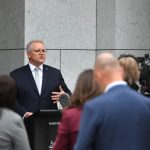The need to design social policy for climate change refugees
So far the Australian government doesn’t seem to regard climate change as a primary issue. Elisabeth Stafford says we need a national conversation to pressure the Australian government into action to create social policy on a variety of climate change fronts.
The Australian government has taken little action to address the overall challenge of climate change. This is partly due to the lack of accountability the Government feels, with Tony Abbott making this obvious by failing to make climate change a priority and doing things like overturning the Carbon Tax without establishing a genuine alternative.
The Liberal government also completely ignored the findings and suggestions of the recent Intergovernmental Panel on Climate Change Report and failed to address climate change as a primary issue in the recently released Intergenerational Report. A core reason why the Government is failing to take responsibility (and getting away with it) is that the Australian people are also failing to make climate change a priority, evident in the fact that we continue to endorse a government where our Prime Minister is renowned for having made comments in the past like “The argument [behind climate change] is absolute crap”.
By failing to address climate change overall, we are heading obliviously into a world where the effects of climate change will not only be devastating to the environment but will directly ruin the lives of countless people.
The brunt of climate change is likely to be felt most severely by some of the world’s poorest (UNHCR, 2014). This is already starting to become evident in Australia’s own backyard, with Pacific Island nations like Kiribati and the Carteret Islands having inadequate resources to deal with the consequences of climate change such as relocation due to sea level rises, severe weather and food security issues (UNHCR, 2014). Ironically, these very people who are the most affected are also those with limited economic power, making it difficult to direct climate change policy and debate and being somewhat forced to rely upon wealthier neighbouring countries such as Australia taking responsibility for their actions as the region’s main contributors to climate change.
An estimated seven million refugees in the Pacific region will be forced to find new homes in neighbouring islands or countries like Australia and New Zealand once low-lying islands become victims of sea level rises (UNHCR, 2014; IDMC, 2014). New Zealand has already received (and rejected) their first application from a Kiribati man for refugee status as a direct result of climate change and it is unlikely that climate change refugees will be recognised in Australia any time soon either (UNHCR, 2014). However the UN concedes that the 1951 definition of what it means to be a refugee needs to be revisited in light of climate change (UN, 2014; UNHCR, 1951).
With the Liberal Party still debating the validity of climate change, its seriousness and sometimes its very existence, individual Australians, families and communities need to take responsibility for what our government refuses to (The Australian, 2009). We can do so by having immediate and serious public discussion, in the media, at work and in social situations, to highlight the urgency of the matter and agree that we should not and will not endorse a government that doesn’t make climate change an immediate priority. The aim of this “national conversation” is to pressure the Australian government into action to create social policy on a variety of climate change fronts, including protecting vulnerable people from its effects like the loss of their land, livelihoods and potentially their culture.
We need to recognise that we are going to have an influx of refugees and climate induced migrants and on that presumption need to design social policy that extends to protecting them; in line with our Australian values of equality, and helping our neighbours in need, who will very soon literally become our next door neighbours in need.
References
- Hockey, J. (2015). The Treasurer of the Commonwealth of Australia. 2015 Intergenerational Report. Australia in 2055.
- Intergovernmental Panel on Climate Change. (2014). Summary for Policymakers.
- Internal Displacement Monitoring Centre. (2014). Global Estimates of people displaced by climate change.
- The Australian. (12 December, 2009). “Town of Beaufort changed Tony Abbott’s view on Climate Change”.
- United Nations. (2014). Should international refugee law accommodate climate change?
- UNHCR. (1951). Convention on the Rights of the Refugee.
- UNHCR. (2014). Pacific Islanders face the reality of climate change and of relocation.
Elizabeth Stafford is a third year social work and psychology student at Queensland University of Technology with an interest in social policy.












